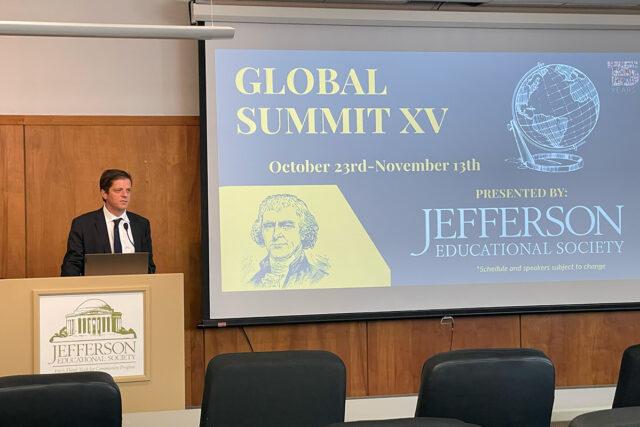
Jefferson Educational Society leadership participates in and present at seminar on social capital at OECD headquarters in Paris, while the think tank hosts an international study tour visiting Erie
On Wednesday, Oct. 2, the Jefferson Educational Society’s President, Dr. Ferki Ferati, and Vice President, Ben Speggen, participated in and presented at “Transforming Places: The Role of Social Capital in Place Transformation.” The event, hosted by the Organisation for Economic Co-operation and Development (OECD), an intergovernmental organization with 38 member countries, including the United States, representing more than $54 trillion global GDP, and was held at the organization’s headquarters in Paris, and was part of its “Unpacking the ‘Soft’ Infrastructure of Transformation’ seminar series.
Drawing from the research of his doctoral dissertation, Ferati presented, “How a Community Think Tank is Transforming a ‘Civic Desert’” to outline and showcase the work and impact of the JES, a nonpartisan, community-based think tank promoting civic engagement through civic education across the JES’s various divisions – from its programming to its publications to its civic leadership academy.
“It was an honor to have been invited to participate in such an informative and engaging dialogue with members of the OECD’s team and fellow experts, scholars, and practitioners,” Ferati said. “We know that to truly, and meaningfully, help regions transform, grow, and prosper, it takes more than measuring the impact and investment of ‘hard’ infrastructure, like economic development; it takes social capital building – the cultivation of personal relationships, social network support, civic engagement, and trust and cooperation. We’ve seen its power and potential in Erie and believe our work and mission can help inform others nationally and globally.”
“If we have the chance to help others realize similar transformation by sharing our story, it is our duty to not keep what it is we are doing and have accomplished here a secret to ourselves,” Speggen said. “We are grateful to have had the opportunity to discuss the work of the JES and progress being made in Erie at the international level while also learning about other work and from other models we may explore locally to continue to drive progress.”
The invitation to engage with the OECD and others stemmed from the JES’s partnership with and participation in the Heartlands Transformation Network, a transatlantic collaborative partnership dedicated towards closing geographic economic divides and reconnecting residents of rural and former industrial heartland communities to economic opportunity, which the think tank joined earlier this year. Network members work to return community pride and optimism about the future, and diminish the appeal of polarizing, resentment-driven, isolationist and ethnonationalist political movements that threaten our democracies.
The JES’s involvement in the Heartlands Transformation Network also helped to facilitate a stop along an international study tour, “Transatlantic Dialogue on the Industrial Heartlands: Shaping the Future.” The tour, organized by Das Progressive Zentrum, a think tank based in Berlin, in cooperation with Progressive Policy Institute (Washington, D.C.); The Chicago Council on Global Affairs; and the BMW Center for Contemporary German and European Studies at Georgetown University aims to “shape the transition to a cleaner, greener, modern global economy in the industrial heartlands in Germany and the United States through transatlantic dialogue and exchange of best practices between experienced actors across politics, the private sector, and civil society on both sides of the Atlantic,” according to the organizations.
An integral part of the project includes the U.S. study tour through the Rust Belt and Midwest, which began in Pittsburgh and traveled to Erie, then Youngstown, Ohio and Detroit. Study tour participants included 12 non-resident fellows – young experts, practitioners, and professionals from the United States and Germany – with the aim to meet with local decisionmakers and leading civic and civil figures, as well as the private sector, to learn how they navigate industrial revitalization in their respective regions. This included meetings with representatives from the JES’s Board of Trustees as well as JES team members, and the JES’s Civic Leadership Academy alumni network.
“It was a tremendous opportunity to gather folks from our more than 220-strong alumni network to meet with the cohort of national and international fellows to discuss the opportunities in a place like Erie, Pennsylvania, and how that compares and contrasts with the lived experiences in the places they call home as we learned about the towns, cities, and regions they represent,” said Tamer Fahmy, an IT Administrator at Erie Insurance and President of the JES’s Civic Leadership Academy Network. “We are energized from the conversations had and look forward to continuing to foster these newly formed relationships.”
“Among the various roles the JES provides, the JES team values its contribution to the community not just as ‘connector’ but as ‘multiplier’,” said Chelsea Oliver, Director of Marketing and Community Engagement at the JES. “We take seriously our mission to serve as platform to connect people with ideas in meaningful ways — whether locally, nationally, or internationally, as we explore our commonalities and learn from our differences.”
While in Erie Monday, Sept. 30 and Tuesday, Oct. 1, the fellows also met with representatives from the Erie’s Black Wall Street, the Erie Downtown Development Corporation, the Erie County Redevelopment Authority, and Penn State Behrend and the Northwest Pennsylvania Innovation Beehive Network among others. The fellows will continue their research and produce their findings in the near future.
The Heartlands Transformation Network, its learning exchanges, convenings, events, study tours, presentations, publications, and other learning products are conducted with partners including the Eisenhower Institute at Gettysburg College, the Brookings Institution; the Georgetown University BMW Center for German and European Studies; the Ruhrkonferenz of North-Rhine Westphalia; Policy Manchester at the University of Manchester, U.K.; the University Allianz Ruhr; the German Consulate General in Chicago; the University of Michigan; the European Commission Directorate of Regional and Urban Policy; and the Committee of the Regions of the European Union, among others.








